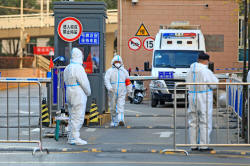Samsung, Micron warn China's Xian lockdown could disrupt memory chip
manufacturing
 Send a link to a friend
Send a link to a friend
 [December 30, 2021] By
Joyce Lee and Manya Saini [December 30, 2021] By
Joyce Lee and Manya Saini
(Reuters) -Samsung Electronics and Micron
Technology, two of the world's largest memory chip makers, warned that
strict COVID-19 curbs in the Chinese city of Xian could disrupt their
chip manufacturing bases in the area.
The lockdown in the city puts further pressure on global supply chains
and adds to a torturous year for exporters facing sharply higher freight
costs even as prices for raw materials including semiconductors
skyrocket amid the two-year long pandemic.
The curbs could cause delays in the supply of DRAM memory chips, widely
used in data centres, Micron said on Wednesday.
The stringent restrictions, which went into effect earlier this month,
may be increasingly difficult to mitigate and have resulted in thinner
staffing levels at the manufacturing site, Micron added.
Samsung Electronics also said on Wednesday that it would temporarily
adjust operations at its Xian manufacturing facilities for NAND flash
memory chips, used for data storage in data centres, smartphones and
other tech gadgets.
Samsung's Xian semiconductor facility is currently operating normally,
Chinese media group Yicai reported on Thursday. Analysis provider
TrendForce also said Samsung's Xian plant is manufacturing without
significant disruptions for now and supply of raw materials seems
sufficient, but there may be a slight decline in output if the pandemic
is not controlled.

"The impact on global supply is controllable, though there are
uncertainties," said Yan Chengyin, consultant and manager at
Beijing-based Bayes Consulting.
"The uncertainty is how soon the spread of the virus can be stopped and
factories can return to work as normal. In our experience, clusters of
cases will be under control very soon in China. Also I think the local
government will try to support large foreign companies like Samsung."
Seoul-based analysts said chips made in Samsung's Xian NAND plant mainly
go to China with limited shipments heading overseas. Some of the biggest
demand for the kind of chips made in the plant come from Chinese server
companies, they added.
[to top of second column] |

Workers in protective suits stand at an entrance to a university's
residential area under lockdown following the coronavirus disease
(COVID-19) outbreak in Xian, Shaanxi province, China December 20,
2021. China Daily via REUTERS/File Photo

TrendForce said on that smartphone and notebook computer makers may be directly
impacted by any changes in operations at the Xian production base, but noted
that Samsung's relatively high inventory level can supply buyers without any
snags in the short run.
Chinese officials have imposed tough curbs on travel within and leaving Xian
from Dec. 23, in line with Beijing's drive to immediately contain outbreaks as
they appear.
The COVID-19 outbreak in Xian is the biggest seen by any Chinese city this year,
with over 1,100 cases in total during the latest flare-up.
"We are tapping our global supply chain, including our subcontractor partners,
to help service our customers for these DRAM products," Micron said in a blog
post
https://www.micron.com/about/
blog/2021/
december/micron-statement-on-current-situation-in-xi-an-china.
"We project that these efforts will allow us to meet most of our customer
demand, however there may be some near-term delays as we activate our network,"
the company said.
Micron added that it was working to minimize the risk of virus transmission and
had employed measures including physical distancing and on-site testing and was
encouraging vaccination.
Samsung's memory chip operation in Xian is one of the largest foreign projects
in China. The tech giant has two production lines in Xian making advanced NAND
Flash products, which account for 42.5% of its total NAND flash memory
production capacity and 15.3% of the overall global output capacity, according
to TrendForce.
Samsung is expected to announce October-December earnings results in January.
(Reporting by Manya Saini in Bengaluru, Joyce Lee and Heekyong Yang in Seoul;
Additional reporting by Sophie Yu in Beijing; writing by Shri Navaratnam;
editing by Himani Sarkar and Jason Neely)
[© 2021 Thomson Reuters. All rights
reserved.] Copyright 2021 Reuters. All rights reserved. This material may not be published,
broadcast, rewritten or redistributed.
Thompson Reuters is solely responsible for this content. |